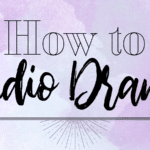How to Audio Drama: Finishing Your First Season

You’ve edited your first season. That means when it comes to the writing, at least, you’ve finished your first season. For me, I expected a sense of pride and relief when I finished our first season–only to be met with, essentially, an existential anxiety spiral.
This might not be the case for you. I hope it isn’t! But in case it is–and in case the dread sets in as you get further away from finishing your first season–here is how you should handle the very emotional process of completing a massive chapter of work.
Walk away immediately
It’s easy to feel like your next course of action should be launching directly into the next steps of making your first audio drama, but I highly recommend giving yourself plenty of space away from the project as a whole. You should prepare for self-critical thoughts, and that means both distance and self-care are important. I don’t mean self-care inasmuch as a bubble bath–though, I mean, why not?–but more inasmuch as being kind and forgiving to yourself as prep work.
Engage in other media
What helped my brain most when we finished editing our first season was getting away from podcasts almost entirely for a while. My capability for this was limited; listening to a ton of podcasts is literally half of my job. If you’re able, though, I recommend stepping away from everything except the releases that really excite you. This will help with my next point, but first, let’s talk about why engaging in other media is helpful for you right now.
First, media will hopefully keep your mind off of this season’s scripts. This will help keep the desire to go back and edit more at bay, and likely just bring your mind some comfort. Escapist media can be lovely for this, but so can media that begs for analysis. I’m a fan of switching between the two, giving my brain a break but also keeping it engaged. If I spend too long playing Dragon Age: Inquisition, I’ll slowly melt into my couch and never want to work again. If I spend too long devouring video essays, my brain will be too burnt out by working overdrive to get back into working on my podcast. Find a balance that keeps you in that sweet spot between exhausted and engaged.
Second, other media is a great source of inspiration–especially if you’re not looking for it. Engage with other media to take care of your brain, and you’ll likely find that because you’re paying closer attention without your podcast in mind, you notice much more. Marathoning a new show might lead to inspiration for music or a performance later on. Focusing on a great film might lead to inspiration for editing and transitions. And, of course, diving into a novel can always help learn new voices, new ways of writing, and new concepts.
But don’t let yourself make comparisons
Just after writing the novel my podcast VALENCE was adapted from, I watched Mr. Robot for the first time. This was a grave mistake for my mental wellbeing. While there were some huge differences–Mr. Robot doesn’t have magic, and it’s also much straighter than VALENCE–the concepts, moods, and even characters were so similar to what I wanted to accomplish. I sat back after finishing the first episode and thought, “Well, I guess I didn’t need to write this 150,000 words after all. This is my concept but good.”
Was this Mr. Robot‘s fault? Absolutely not. My tendency to compare my own work to others’ was at fault here. Why did I expect that my work would be on par with Sam Esmail, who not only had a massive budget and an incredible cast, but also degrees in computer science (relevant to both of our concepts) and film from Tisch, plus an MFA in directing from the AFI Conservatory, plus two films under his belt?
I know I’m not alone here. These types of comparisons come so naturally to us, especially in art, and it’s hard to quiet them. Instead of letting the comparisons nag at you, try pivoting them into appreciation for the work. Remember that nothing is really original, and that comparing two different works usually doesn’t really make sense.
Mr. Robot itself has been called derivative plenty, and its inspirations are clear. But also, Mr. Robot has wildly different goals and themes from VALENCE when both works are looked at comprehensively. Why compare two works that aren’t even trying to say the same thing past a surface level? I wish I could tell my past self, “Be thankful this show exists instead of comparing it to your work.” Mr. Robot rules, and I make a show with a similar vibe because I think that vibe also rules. There is no upper limit on how much art can exist. I wish I could have been as grateful to just work in that vibe alongside everything else that fits there.
Not motivated by positivity? Not a problem. Let’s talk about another work that fits the same vibe as VALENCE and Mr. Robot: Black Mirror‘s “Bandersnatch.”
I do not enjoy this choose-your-own-adventure style show/film/”event,” and in fact, I am very annoyed by the idea that this team–which, yes, had a proven track record of quality execution–did such a bad job with such a cool concept in a vibe I care about very deeply. I am not motivated by positivity when it comes to “Bandersnatch.” It accomplished many things I could not, and I did find myself drawing comparisons–but instead, I choose to be motivated by spite.
If it is what the situation calls for it, aggrandize yourself. Allow yourself to be pompous and presumptuous and say, “I’m going to make ‘Bandersnatch’ but good and on a shoestring budget, just to prove that they should have done better!” If it works, it works. I recommend at some point humbling yourself again, but honestly . . . you do you.
Share your scripts with a friend
As you take time away from your scripts to indulge in some other media, send your scripts to a friend who has not worked on the project. Make them sign an NDA if you need to (honestly, I’ve found that signing NDAs when trust already exists in a relationship usually just makes people feel cool and fancy) so you can protect your IP. Try to send it to someone who’s familiar with podcasts, but not someone who works on one. What you’re looking for here is someone who isn’t involved to tell you that you did a good job.
Do not ask for edits. Do not ask for feedback. You have already edited your season. Instead, send it to them because it’s something you worked on and you’re proud of it (bonus tip: be proud of it). Tell them you’d love their reactions if they’re willing to provide, but that you aren’t looking for any criticism right now.
This friend is your first audience member. The podcast may not be a podcast yet, just pages of scripts, but the work is already in the hands of an audience member. Cement this as not being able to scrap the project or do massive rewrites. You’ve just made your art semi-public, and that means that this version will always exist to the team behind it, but also at least once audience member.
Mentally prep for your casting call
Your casting call is going to be the first major endeavor on your podcast that is, by approximate percentage, more logistics than it is creative. Your casting call is a new step on the journey to making your first audio drama a reality, and that means putting all of the creative content for the first season behind. Try to get your mind into a linear, productive space that will allow for organization, fact-finding, form-building, and more. Casting calls can still be some of the most fun you’ll have making your audio drama, but there’s no doubt the feeling of rigor is different. Buckle in; from here on out, things get even more real.
How to Audio Drama is our weekly column documenting every piece of information you’d need to start your own audio drama (aka fiction podcast). The series can be read in full, or read volume by volume. You can use our table of contents to find each How to Audio Drama installment, and you can submit questions to our monthly How to Audio Drama advice column.













Comments
Comments are closed.